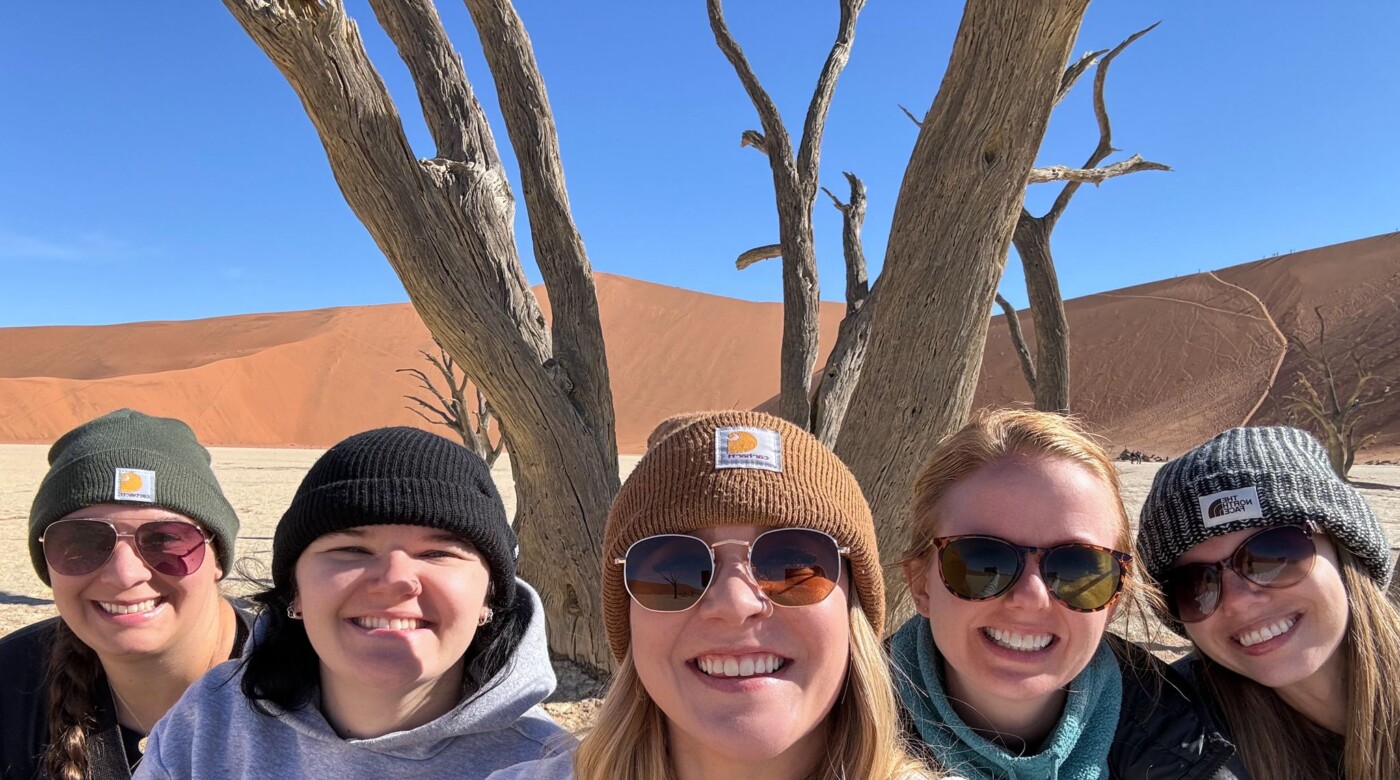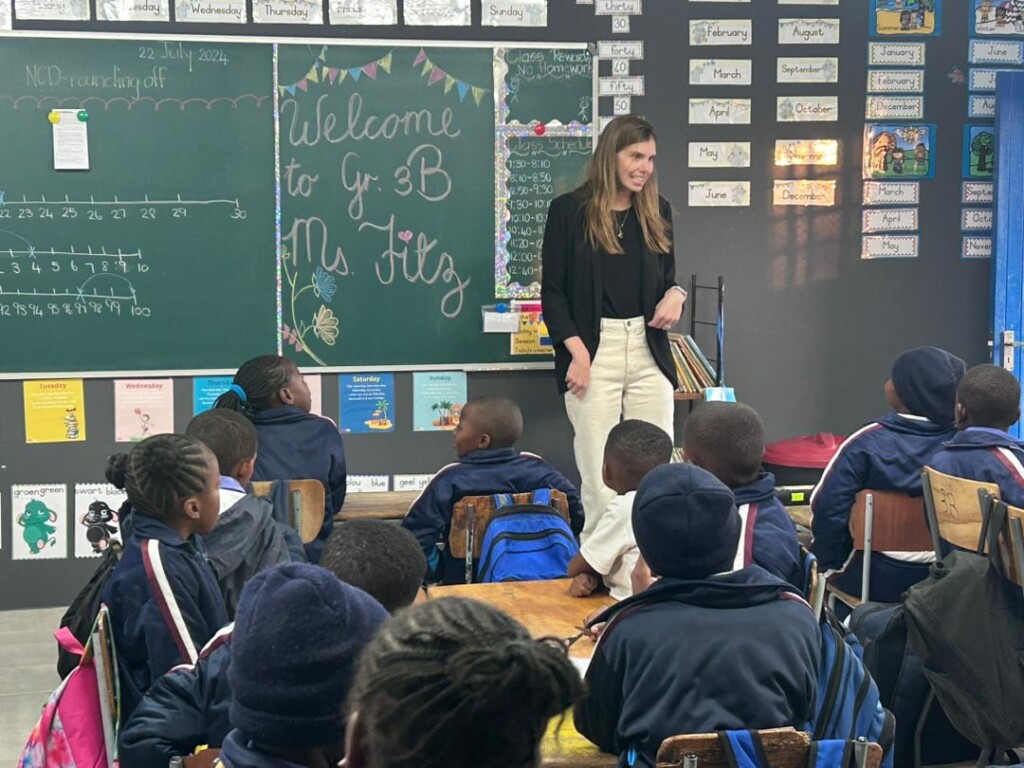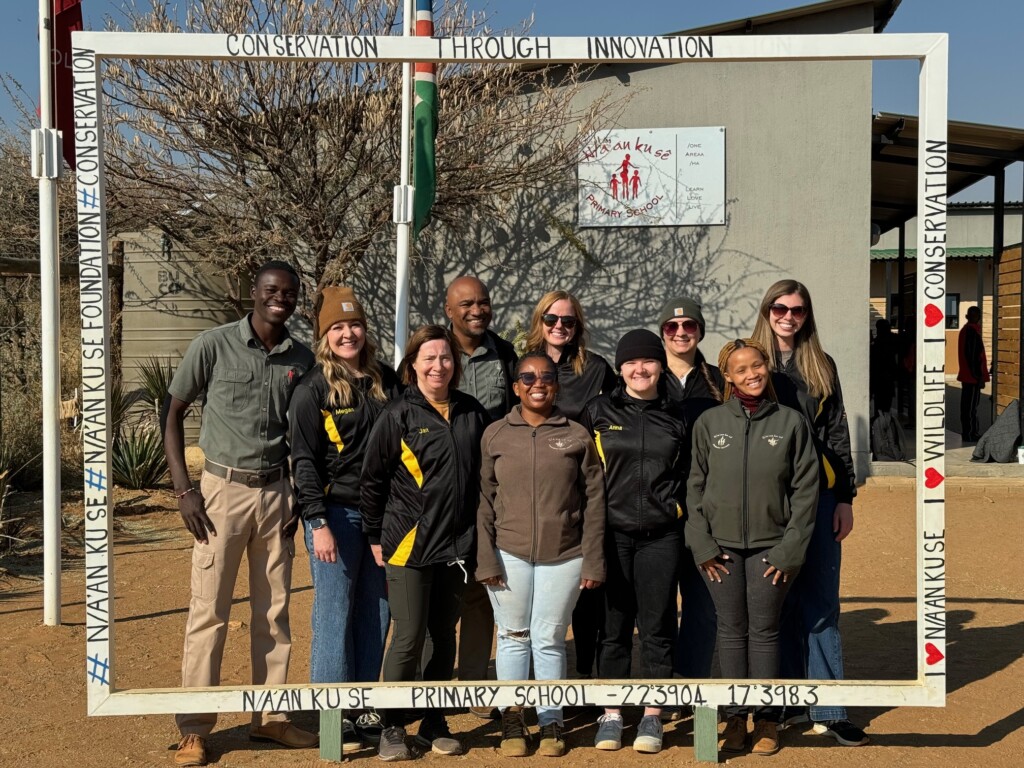Collective Action Rooted in Reciprocity
The Uukumwe Project continues to inspire teacher development

Image: The PLU Uukumwe team at Sosusvlei
By by Emily Holt, MFA ’16
PLU Marketing and Communications Guest Writer
At a summer 2023 banquet launching the Uukumwe Project, Sanet Steenkamp, executive director of Namibia’s Ministry of Education, Arts, and Culture, advised a group of Namibian and American teachers not to hold back. “The children,” she said, “deserve for us not to hold back.”
Steenkamp’s speech resonated with Autumn Fitzgerald ’10, a K-5 instructional specialist at Willow Crest Elementary in Auburn, in part because it was as challenging as it was inspiring.
“We come from a culture in which ‘beating around the bush,’ as my Namibian colleagues called it, is the norm—tiptoeing around feedback to protect the feelings of adults above what’s best for the kids,” Fitzgerald explained. Still, the concept stuck with her, and she found herself being bold and taking chances to speak more directly.
Led by Associate Professor of Education Jan Weiss, the Uukumwe Project is an exchange program with teachers who graduated from PLU and teachers from schools in the Khomas region of Namibia. It builds on a long-standing connection between PLU and Namibia that has its roots in the anti-apartheid efforts in the U.S. in the 80s and 90s.
This summer, the original Uukumwe team of PLU alumnae returned to Namibia for two weeks—first to offer professional development to the teachers at N/a’an ku sê Primary School, a school located on a wildlife sanctuary and serving the indigenous San people, and then to the classrooms they’d visited in 2023.
During the teacher workshop at N/a’an ku sê Primary, the PLU alumnae focused on everything from norm setting and classroom protocols to elevating a sense of community and encouraging collaborative practices across grade levels. Each alumna was then paired with a teacher or administrator, and together the teams built student-centered goals, directed by the Namibian teacher’s priorities.
Maura Gannon ’10, a multilingual specialist for the Federal Way school district, primarily worked with principal Lionel Samuels, using classroom walkthroughs to provide teacher feedback and discussing the challenges of being a leader who sometimes has to make difficult decisions. Though Maura has never been an administrator in the U.S., she’s often supported them, and in working with Lionel, realized how much she appreciated the opportunity to provide leadership coaching.
“I really enjoyed working with Lionel,” Gannon says. “Building him up, helping him see all the positives, helping him realize what he wanted for his building and what his next steps were.”
At a classroom-level, the U.S. and Namibian teams focused on implementing high-impact practices. Anna Parker ’17, who’s worked as a 4th and 5th grade teacher in Tacoma, partnered with Lentroutie Cloete, who teaches math, social studies, and Afrikaans to 4th to 7th graders, on a combination of modeling, co-teaching, and small group work. Fitzgerald partnered with Maria Kainamses, a kindergarten teacher whose goals were to increase on-task behavior and teach emotional regulation. Together, Fitzgerald and Kainamses introduced Morning Circle as a time to focus on emotional regulation so that it could then be integrated across other lessons. Whether in N/a’an ku sê or in Tacoma, engagement is key.
“How do you keep everyone engaged in the hard work?” Gannon asks. “How do you build a collective in your school?”
Weiss, who serves as an educational consultant for N/a’an ku sê Primary, says having the original group of PLU alumnae return enabled the team to ask questions about collective impact—not only about what changed in Namibian classrooms, but also about what changed in Washington classrooms.
After last year’s visits—which included a two-week period when Washington teachers hosted their Namibian collaborators—the dialogue between teachers continued over WhatsApp and Zoom conversations. It’s not only been a time for courageous conversations but also a space for the Washington teachers to reflect on their own professional journeys.

Gannon says that after fourteen years in education, she’s been questioning the direction of the system, both country- and state-wide, where she fits, and what her purpose is. Now working in a district in which over a hundred different languages are spoken, Gannon appreciates having a space to assess her cultural competency and consider what it means to enter a school from a space of privilege. An ongoing conversation among the PLU alumnae has been how it might be received in Namibian classrooms for primarily white American educators to arrive seemingly to “fix” teacher practices in a rural, multilingual setting.
From what Weiss witnessed, quite the opposite has been the case. “I was in awe of the thought they put into the planning, the way they collaborated with each other, and the way they could make adjustments in their plans based on the teachers’ needs.”
The success of the collaboration comes in part from a joint rooting in the spirit of Uukumwe, or “togetherness.” For Laura Sorgenfrei ’08, a 5th grade teacher at Wainwright Intermediate School in Tacoma, the project requires a certain humility. “Collaborative practice, sharing challenges and celebration, reflecting on our goals and growth all stem from strong, grounded relationships that require vulnerability and building trust over time,” she says.
On both sides, the project has meant life-long connections and friendships rooted in a spirit of reciprocity.
“Namibia is starting to feel like a second home, and my Uukumwe team a part of my family,” Fitzgerald says. “I feel so invested in the schools, teachers, and learners we’ve worked with.”
Parker notes that after years in education, it can feel like change depends on how much time and effort an individual can put into a system, a school, or themselves; now, though, she has a team of educators she can call on throughout the year for advice and support. “I love the world of education Uukumwe has shown me,” she adds, “that there are so many ways that education can look and have a positive impact on learners and on teachers.”
The moments of impact may seem small, but they can be significant in the microcosm that is a classroom. Aarsvold’s teaching partner, Fransina Samuels, has begun to lead staff meetings, and next year, she will be speaking at a regional summit to share her learning and growth in classroom management.
And just recently Fitzgerald heard that on a walkthrough Lionel Samuels observed Kainamses doing a differentiated small group lesson. Last summer, it was a strategy discussed in a workshop; now, it’s a practice integrated into the daily lives of learners at N/a’an ku sê.



